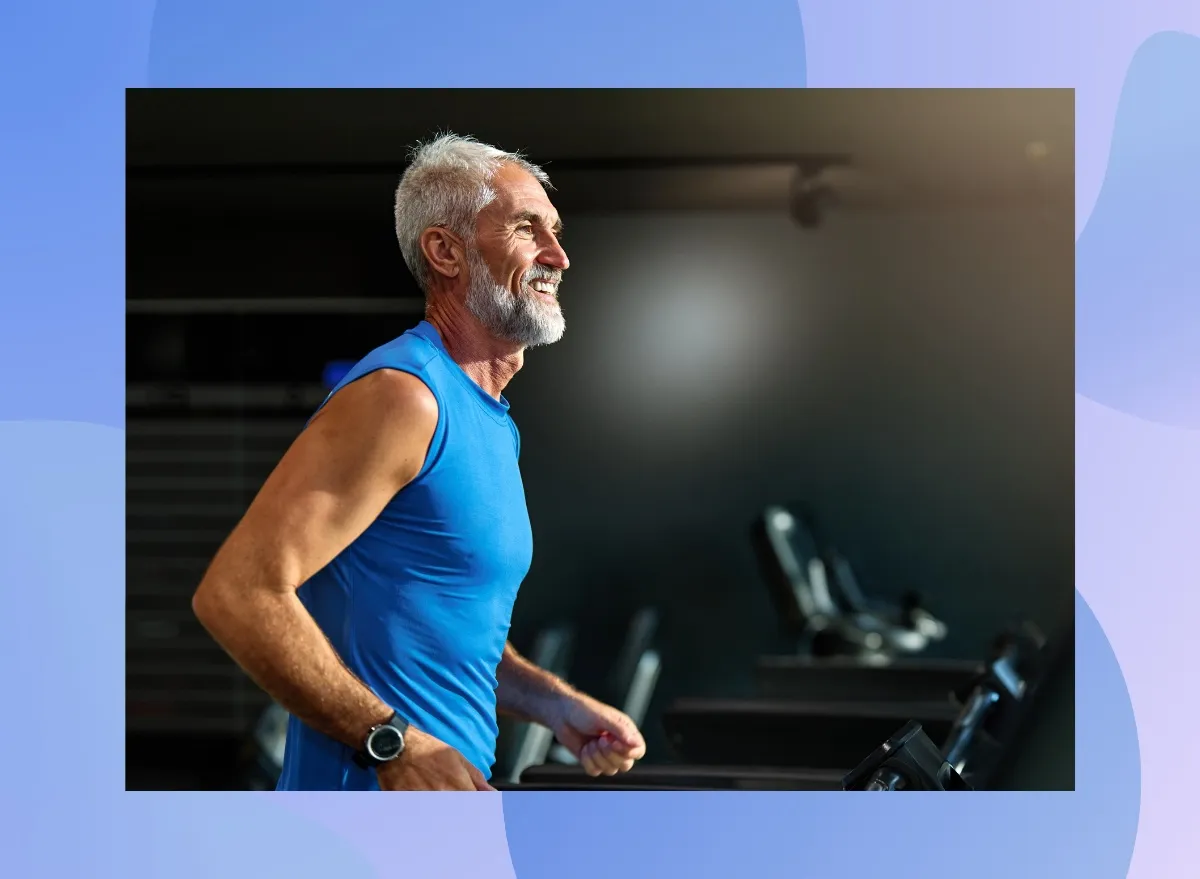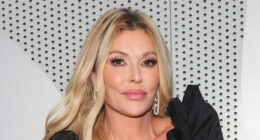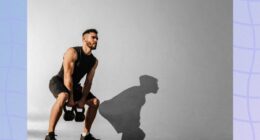I am sitting in a consulting room, talking through the results of an unusually thorough health check. The doctor seems happy with most of them, but he lingers on the squiggly lines of my ECG – a chart of the electrical signals in my heart. He’s found something called a “prolonged PR interval”. I’m very happily married to a PR, so this sounds quite pleasant, but then he explains that P and R are points on the squiggly lines, and that I probably have “first-degree heart block”. I feel a little chill.
I guess these are the risks when you try to find out more about your health. But ignorance doesn’t feel like bliss when you turn 60. How much longer have I got, you want to know. How much of that will be fit and happy? And OK, I’m now getting free prescriptions, which is nice, but is that because I’ll be needing more medicine?
You might call me a late convert to wellbeing. After spending most of my 20s, 30s and 40s underactive and overindulging, in the past decade and a half I have learned to appreciate my body and what it can do. First, when I lived in the French countryside, it was hiking, skiing and swimming; then I discovered running. I enjoy all of this, and it makes me a little less grumpy. I don’t smoke or drink and I do my best to eat healthily. But I can’t help wondering if it’s enough.
My dad died of lung cancer at 67. He collapsed at home while I was away and I didn’t see his body until it was at the undertaker’s – but, 38 years on, I remember his blood on the bedroom carpet, me and my mum soaking and scrubbing so it wouldn’t stain.
Mum died alone in hospital 25 years later, at 88, after a series of strokes. Hers was not a good death – lingering for weeks in a strange bed, never fully conscious, washed, changed, fed and rotated by others. In all that time, she sleep-spoke a handful of words, half of them in French, her parents’ first language. She seemed uncomfortable and no one expected her to recover. If I could have pressed a button to end her suffering, I would have. Instead, when everyone agreed it was wrong to keep her in this half-dead, half-alive state, the doctors stopped the drips that were feeding and hydrating her. Days later – although it felt like centuries – her body finally gave out.
We didn’t have the consolation of believing that she was happy in her final years. She was never one to complain but from the outside it wasn’t much of an existence: frail, confused, pretty much housebound.
I don’t want to die like either Mum or Dad – too soon or too slowly. I want many more good years, then something quick and painless, maybe out of the blue. A runaway bus? A falling piano? I can’t decide if I want time to say goodbye to my wife, the kids, life and the world; or just to go, not be there, clicked off like a light. What I do know is that I want to put off that moment when my body becomes a source of pain rather than pleasure.
I’m doing what I can. I now live in London and run 30-40km every week, go to yoga at least once a week and try to fit in a bodyweight or high-intensity interval training class. I got a personal best in my last half-marathon. At 77kg (about 12st 1lb) I have lost 33kg (5st 2lb) since my days of beer and barbecues. It took me far too long to give up booze, and when I look back at all the stupid things I did and all the money I threw away, I wish I’d never started. But during the pandemic, after almost 40 years of heavy drinking, I finally packed it in. I must have been heading for a stroke or heart attack, but I seem to have avoided that alcoholic iceberg. As far as I can tell, all I have to show for those decades of abuse is wine-etched teeth and some broken veins.
I take two little pills every day – one for my blood pressure, another for an enlarged prostate – but other than that, I reckon I’m in great shape for 60. I definitely feel fitter than I did at 50, 40, maybe even 30.
But I am also aware of how lucky I am, and how quickly all of this could be snatched away. And it wouldn’t take anything as dramatic as an accident or a serious disease.
In the winter of 2022-23, I spent months almost immobilised after spending far too long working on a laptop. What began with a stiff neck and tingling in one arm turned into wave after wave of agony that kept me off work and sent me to A&E. It took me weeks to get the painkillers I needed, and while the exercises the physio gave me made a difference, progress was slow. I finally turned the corner with a shockingly intense massage. I cried twice in 15 minutes, first as I got dressed afterwards, stunned by how much it had hurt, then again as I did my shopping in Sainsbury’s, amazed and grateful at how much better I felt. An earlier massage, from a different therapist, had ended when I fainted and wet myself. This is not unknown when your neck is being manipulated – something to do with the blood supply being disrupted to your brain – but that was no consolation as I headed home in a pair of borrowed tracksuit bottoms.
Looked at one way, this was a urine-scented blip in an otherwise rosy tale of late-life sportiness. To me, it’s a reminder that the older you get, the less you should ignore those dull warnings about workplace ergonomics or the dangers of processed meat.
And I haven’t even mentioned sleep. That’s the one area where I’m really struggling. I have slept badly almost all my adult life, lucky to get an unbroken night or to rack up even six hours in total. There may be a physical reason, but I think it started when my dad was dying – I remember so many dreams of rotting teeth, a nightmare often blamed on bereavement – and was entrenched by years of boozing and clubbing. And sleep is no luxury: a lack of it increases the risk of obesity, type 2 diabetes, cardiovascular disease, anxiety, depression, Alzheimer’s …
I’ve tried almost everything to fix my insomnia, from tai chi and mindfulness to melatonin and sleep restriction, where you drastically cut the time you spend in bed. I did not enjoy staying up until 1am night after night, the alarm set for five hours later. As for pills, while they usually knock me out, they also leave me woozy and washed out. Many experts will tell you that what a lot of pills produce is unconsciousness, not sleep, and that doesn’t give your body a chance to repair itself. So insomnia still feels like a great pillow of Damocles suspended above my head.
A few months ago, troubled by hitting the big 6-0 and clueless about how long I had left, I made the half-serious resolution to live to 100. I instantly felt liberated, empowered, with something to aim for. It’s not an entirely ridiculous hope, with the route to a longer life becoming clearer as scientists explore everything from intermittent fasting to the gut microbiome. “There is no magic bullet for longevity,” Leslie Kenny, a co-founder of the Oxford Longevity Project, tells me when I call her hoping for just such a thing, but there are lots of steps that will take you in that direction. “For example,” she says, “even if you’re 70 years old, you can gain an extra year and a half of life by making some very small changes in diet.”
You could call a century of life unambitious, if you’re channelling the tech entrepreneur Bryan Johnson, who spends millions every year pursuing his goal of “Don’t die”, or Aubrey de Grey, the gerontologist who talks of humans achieving “longevity escape velocity”. But a lot of this sounds like wishful thinking. I can’t forget the artists/architects Madeline Gins and Arakawa, who declared death “old-fashioned” and claimed you could become immortal with the correct (horribly uncomfortable) environment. They barely made it into their 70s.
I’ll be writing about some of this in the weeks, months and – who knows? – decades to come: both the out-there live-for-ever stuff and the mainstream maybe-live-a‑bit-longer stuff.
For a sanity check on the likelihood of making it into triple digits, I ask an actuary. Every time you take out life insurance or a pension, an actuary will have calculated how long you – well, someone like you, from a similar area, of a similar age, background and so on – are likely to live. This is an industry where accuracy counts and, as Stuart McDonald, the head of longevity and demographic insights at Lane Clark & Peacock, points out, you can’t simply use the most widely quoted figures of 78.8 years for men and 82.8 years for women.
This “period life expectancy at birth”, as it is known, “is badly named and tells us almost nothing about how long people alive today can expect to live”, McDonald says. “It is a calculation based on the death rates experienced recently.” In other words, it’s all about the past rather than the future. And those 78.8/82.8 figures are for the whole of England, which makes them even more useless. Life expectancy varies by more than 20 years between the healthiest and least healthy parts of the country.
A more relevant figure is “cohort life expectancy at age 60”, which strips out the effects of infant and childhood deaths and adds a couple of years to reflect assumptions about “future improvements in mortality”. For England as a whole, this leaves us with 84 years for men, 87 years for women. We’re moving in the right direction, though still miles away from De Grey’s “escape velocity”.
It’s even better in my “affluent, good health” cohort. “Reflecting your personal circumstances – a non-smoking, health-conscious journalist living in the south-east – adds another four years to your life expectancy,” McDonald tells me.
That brings my semi-bespoke life expectancy up to 88. If I was a woman, the figure would be 90. And what are my chances of making it to 100? About one in 20, or one in 12 if I was a woman.
How can I improve those odds? And what might hold me back? I’d love to find out from my GP, but although he gives me a quick medication review, talks me through my most recent blood tests, and reassures me about my prostate and blood pressure, he has patients backing up and I want more detail than I can get in a 15-minute phone call. Which is how I end up at Bupa, getting tests and recommendations from a doctor and a health adviser. By the end of the three hours, I know far more than I ever have about my cholesterol level, kidneys and liver, blood count, iron levels, vitamin D, heart rhythm, risk of developing diabetes, stroke or heart disease, BMI, basic metabolic rate, energy requirements, insomnia severity index, mobility, flexibility, grip strength … There’s also a spell on an exercise bike, to measure my overall physical fitness.
There’s a lot of good news – “excellent cardiovascular fitness”, 1% chance of type 2 diabetes in the next 10 years – as well as the less pleasant revelation that I’m 5ft 9in, while I’ve always thought of myself as 5ft 10in. That’s what it used to say on my passport, and what several nurses and doctors have told me in the past. I’d like to think I’m having a bad height day, but it’s more likely I’m shrinking. We lose an average of a centimetre a decade once we hit our 40s.
I also have a body fat level of 27.9%, which sounds enormous but is apparently just “slightly above the ideal”. My cholesterol could also come down a bit.
The real worry, of course, is that prolonged PR interval. It may just be “normal human variation”, Dr Sundeep Chohan reassures me, but he’ll be sending the ECG to a specialist. Checking the NHS website as I wait for the verdict, I learn that while serious cases may require a pacemaker, heart block “normally only needs to be treated if it’s causing symptoms”.
A few days later, I get the all-clear: “The cardiologist agreed that you do have mild first-degree heart block” – that word “mild” makes me very happy – “but feels this is a normal variant and does not need any further investigation.” Phew.
Back in the consulting room, when I ask about the most important thing I should focus on, the doctor doesn’t mention my heart. It’s just: “Sort your sleep out.” Which is comforting and a little frustrating, as I’ve tried so hard to do just that. But then he provides lots of practical advice, from the name of some new pills I should investigate to the possibility I have sleep apnoea, meaning my breathing might be stopping and starting during the night. It’s not quite as awful as it sounds, especially if you can avoid having to use a Cpap machine, which pumps air into a mask that you wear while you sleep.
How long can I expect to live, I ask this man who has just prodded my spleen, checked my vitals and spent 60 minutes discussing my physical and mental health. Now he knows me, surely he’ll say at least 95? “Into your mid- to late 80s,” is the underwhelming reply.
And how much of that will be healthy?
“I’ve had 70-year-olds here doing Ironman.”
There in the consulting room, all I can remember is that Ironman is some kind of gung-ho endurance race. It turns out to be the triathlon from hell, stretching over 141 miles (226km) and often lasting 13 or 14 hours. I think he’s trying to be encouraging, but I’m not blown away. Sure, Ironman – but 70? That’s nothing. I’m in this for the long haul.





